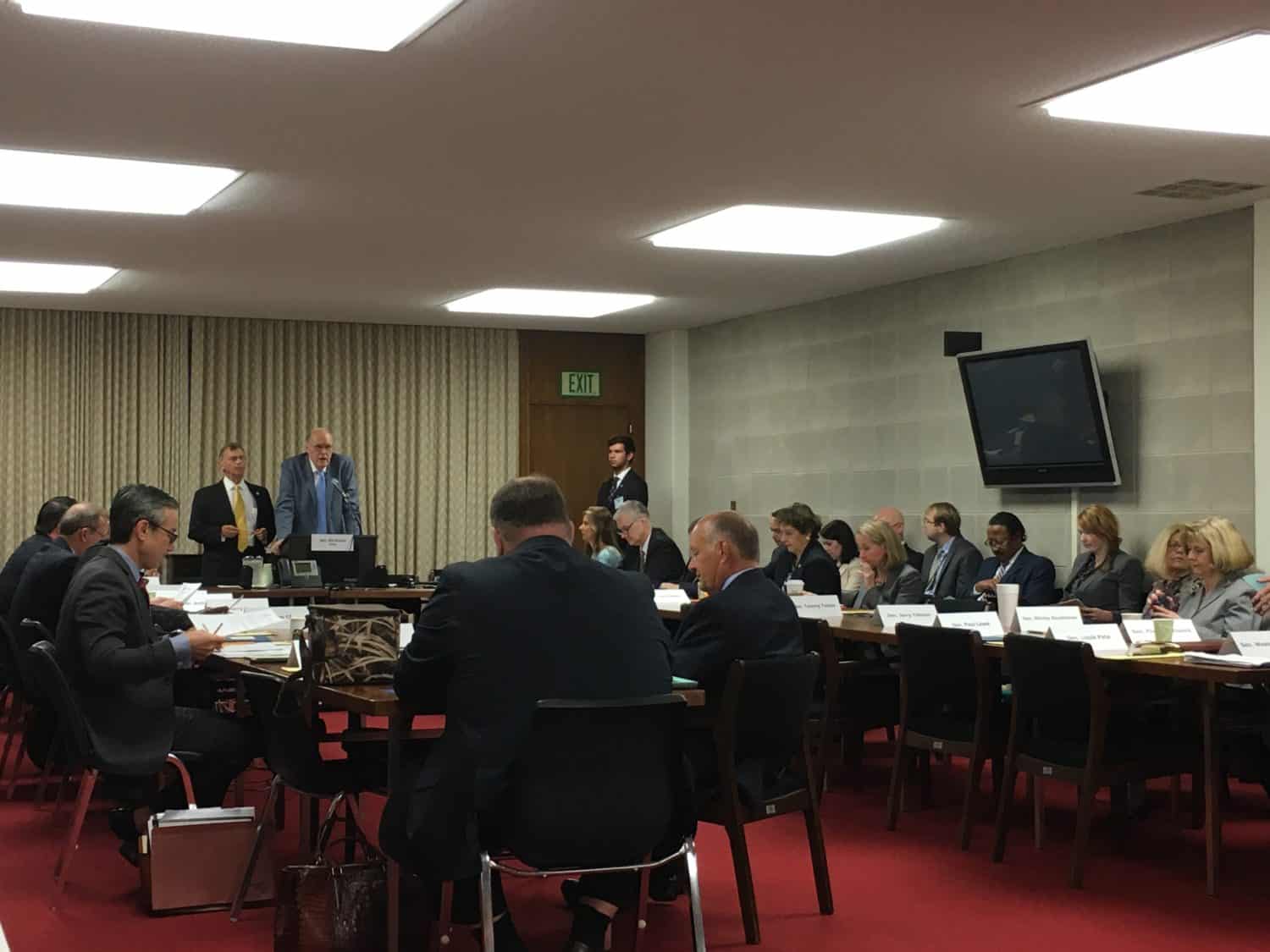It is crossover week which means bills are moving through the General Assembly faster than water through the rained-out streets of Raleigh these past few days. Today was no exception.
A number of education bills made their way through committees in both the House and Senate.
Senate Rules Committee
House Bill 13
House Bill 13 was given a favorable vote in the Senate Rules Committee this morning. It goes to the full Senate at 4 pm today. Since the bill already passed the full House, it is not required to go any further in order to stay alive until after crossover.
The bill that passed the Rules Committee this morning differs from the one passed by the House, however. The House bill loosened restrictions passed in the 2016 budget on class sizes in grades K-3.
Those class size restrictions for districtwide average class sizes are as follows:
– Kindergarten: 1:18
– First grade: 1:16
– Second grade: 1:17
– Third grade: 1:17
The restrictions were slated to go into effect in the fall.
House Bill 13 would originally have allowed the average class size to exceed the above funded allotment ratios by three students, and the maximum individual class size to exceed these numbers by six students.
The compromise version that passed the House Rules Committee, however, instead puts a one year delay on the implementation of the class size restrictions passed in the 2016 budget. For next year, the rules would be as follows:
For 2017-18, the K-3 class size would not exceed 20 students, and the maximum individual class size would not exceed 23 students.
The revised bill also requires biannual reports from school districts that include information on teacher funding, class sizes, and program enhancement teachers, along with any other information requested by the Superintendent of Public Instruction.
The superintendent is required, under the amended bill, to conduct periodic audits of the reports. If any noncompliance is found, the State Board of Education could withhold the local superintendent’s salary.
The big argument opponents of the class size restrictions have made is that they eliminate flexibility needed to fund extracurricular teachers for subjects like art, physical education, and music.
Sen. Chad Barefoot, R-Wake, said that while that specific subject is not addressed in the new version of House Bill 13, he recognizes that funding will have to be provided for those teachers.
“There is an acknowledgement that we will have to come in alongside that and fund probably a new allotment specifically for specialty teachers,” he said.
He said funding for those teachers is not provided in the bill because the General Assembly does not have complete information on much they cost. Districts around the state were surveyed to get details on how they spend money already given by the legislature for class size reduction. The answers that came back did not paint a clear picture, Barefoot said.
“One of the reasons we’re requiring so much reporting from the districts is because they wouldn’t or couldn’t tell us how they were spending the money,” he said.
In a letter to senators, the N.C. Association of School Administrators, which distributed the surveys, said that “School districts have been responsive, cooperative and transparent in providing the requested information.”
Barefoot said that the House, Senate and N.C. Association of School Administrators are all on board for the revamped version of HB 13.
This morning, Sen. Terry Van Duyn, D-Buncombe, urged the Senate Rules Committee to delay implementation of the new class size restrictions by two years instead of one.
“We don’t come into short session until May. And this is sounding like a significant problem,” she said. “Why don’t we instead of just giving them one year, why don’t we give them two years so that we can come back in the short session, look at the reports we get and address this problem as completely as possible?”
Barefoot, however, was adamant about moving forward with class size reductions sooner rather than later. He said that reducing class sizes has been one of the biggest policy pushes of the General Assembly for the past few years, and that districts have received money to do so but have failed to follow through.
“I’m not arguing that superintendents spent the money on trips to Mexico,” he said. “What we are saying is we gave them money to lower classroom sizes and we clearly see they didn’t use it for that purpose.”
Sen. Floyd McKissick, D-Durham, brought up the issue of building capacity. The bulk of money for school infrastructure is covered by counties, not the state. As such, many districts have complained the class size restrictions will require them find extra funds for facilities to accommodate the extra classes that will be needed.
Barefoot said that the onus is on counties, and they have shown through their misuse of money for class-size reductions that many of them are not planning well for their schools.
“They have to strategize on how to accomplish those goals. And they haven’t been,” he said. “They’ve just been taking the money from us, not doing what we’ve asked them to do with it, and not planning appropriately.”
McKissick maintained that the need for districts to come up with extra money for buildings was an issue not addressed by HB 13.
“Infrastructure capacity is a whole separate issue,” he said.
See our explainer of the issue here.
Senate Bill 15
Senate Bill 15 would grant extra classroom teachers to geographically isolated schools.
“This is to provide the teachers they need to meet their class size requirements for those schools that are isolated in various areas of the state,” said bill sponsor Sen. Jerry Tillman, R-Randolph.
These schools have a small number of students in their classes but, because of where they are located, cannot be merged with other schools to provide more appropriate class sizes.
The bill was given a favorable report.
House Education Committee
House Bill 826
Currently, the state defines low-performing schools as those schools that receive a D or F on the school performance grades and have either met or not met expected growth.
House Bill 826 tweaks the definition so that schools that met growth would not be included.
“What this would do is give a more realistic and more fair evaluation of the schools,” said bill sponsor Rep. Dennis Riddell, R-Alamance.
The bill was given a favorable vote. Rep. Graig Meyer, D-Orange, supported the bill, but told lawmakers that the state still needs to do more for these schools.
“I just want to remind the committee that we still have no significant way to support all the schools that are identified as low performing,” he said.
For 2015-16, there are a total of 489 low-performing schools and 10 low-performing districts. See a full list here.
House Bill 600
In the wake of Hurricane Matthew, some schools faced damage or closure because of the storm’s destructive winds. Representatives spoke about the repercussions of that storm when discussing the need for House Bill 600 which would give local boards of education flexibility to enter into lease agreements for school buildings and other facilities.
“We have schools in our county that are severely damaged. I think it’s very timely,” said Rep. Charles Graham, D-Robeson. “I do support this for the simple fact that we need to come up with alternative ways to support our school construction,”
The bill was given a favorable report.
House Bill 704
Rep. William Brawley, R-Mecklenburg, a sponsor of House Bill 704 , presented the plan to create a task force to investigate the process that would be necessary to divide big school systems into smaller ones.
“From time to time there are discussions about large school systems and whether they’re too big,” he said, adding: “But what we’ve never studied is how big is too big?”
He said the purpose of this bill is to answer some questions related to how such a process would work if it were undertaken. Questions such as: What procedures would be followed? How would the community be included in the discussion?
“Let’s actually study it and see if we can generate some data,” he said.
The bill was given a favorable report.
Recommended reading




